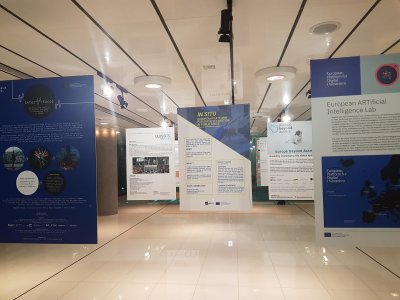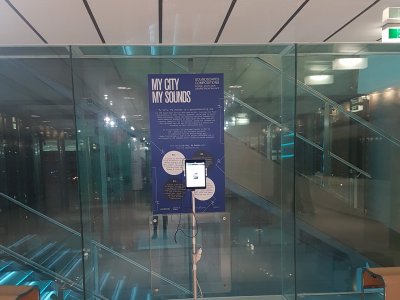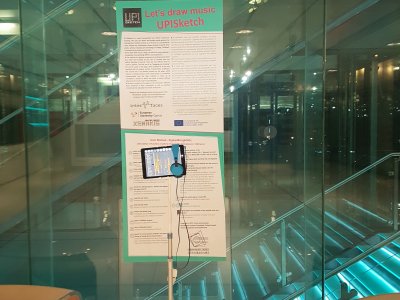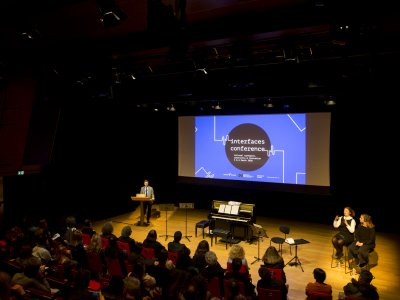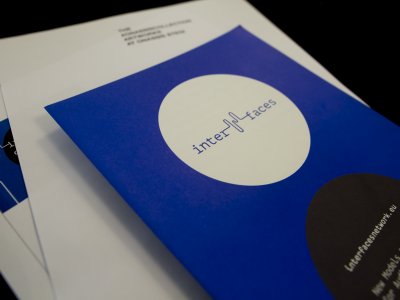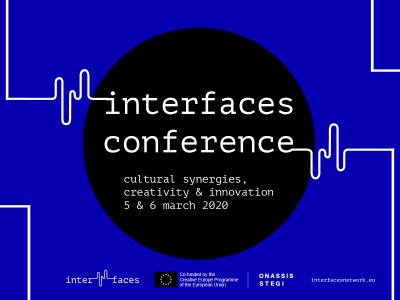Contemporary culture is shaped through discussions, encounters, exchanges. Four years after its official launch, the interfaces program culminates in an international conference that brings together creative Europe in its entirety.
The Interfaces Final Conference “Cultural synergies, creativity & innovation” was a two-day international event that explored how cultural synergies could contribute to innovation and creativity in the field of Culture.
The conference brought together representatives from projects funded by Creative Europe program, cultural practitioners and policymakers to discuss, re-think and re-use strategies on strengthening audience development as a means of improving access to European cultural and creative works, promoting the transnational mobility of artists and professionals and fostering capacity building through innovative approaches to creation, management and marketing for the cultural sectors.
The Conference included insights, perspectives and tools developed during the Interfaces project and connects these with other initiatives, projects and collaborations in Europe and beyond.
----> watch the videos from the conference from the conference
DAY 1: 5/03/20
17.00-18.00_Arrival & Registration
19.00-20.00_ “European collaboration as a means to further explore the possibilities of arts and science interactions”
Paul Dujardin, CEO and Artistic Director, Center for Fine Arts Brussels (BE)
In the light of current global challenges related to the sustainable development of our societies, interactions between arts and science have tremendously evolved and expanded in the last decades. It is a sign of the times that an ever-growing number of artists and institutions are interested in the latest technological and scientific developments accelerating changes in the world at an ever-increasing speed. This high-speed evolution requires new initiatives to establish better connections between these stakeholders at all levels.
The hierarchy between the arts & empirical sciences predominant in the 20th century can no longer be taken for granted. By enabling artists’ and other communities to input experimentally creative, critical and societal ideas, by creating a fertile context for change and by bundling the forces of multiple actors we can realise concrete breakthroughs.
20.00-20.30_ Interfaces – Under the spotlight
Christos Carras, Executive Director and Music Program Curator, Onassis Stegi, (GR)
Dora Vougiouka, EU Networks & Outreach Coordinator, Onassis Stegi (GR)
20:30-21:00_Film Screening: “Interfaces – A Network of Sonic Arts”
Directed by Angeliki Aristomenopoulou
Production by Loukas Valentis / White Room
21.00-22.30_Reception
DAY 2: 6/03/20
09.00-10.00_Networking Breakfast
10.00-11.00_ “European Networks as Cultural Entrepreneurs in the Public Realm”
Dr. Milena Dragićević Šešić, Head of UNESCO Chair in Interculturalism, Art Management and Mediation,Professor of Cultural Policy & Management at University of Arts, Belgrade (RS)
Nowadays, European Networks and cultural and creative projects are linking PEOPLE from different communities, creating new platforms for artistic and knowledge exchange. These projects are bringing new ideas and concerns in areas such as culture of memory, cultural identity, nationalism, citizenship, and participatory democracy, but hardly find way for cross-fertilization and discussion in wider public sphere. This paper will discuss their contributions and raise numerous questions: How public role and interest for culture could be defended? How to endorse civic imagination, raise civic engagement and participation, enable flows of ideas in European cultural space? How artists and cultural operators react on challenges of the XXI century (migrant crisis, global warming, digitalization, etc.) influencing European identities?
11.00-12.15_panel discussion 1: Inclusion, Diversity, Access, and Equity in the Arts and Culture Sector.
Celebrating the Interfaces project’s strategic goal, namely, to bring new music to new audiences, this panel looks more widely across the arts into areas ranging from inclusion to co-creation and more. Concepts such as outreach, access, education, experimental art for all, participation, art and life and new communities of interest and of practice formed a through line during this panel with specialists representing visionary and pioneering work across a diversity of artistic areas with a broader diversity of new potential audiences and creative artists.
Moderated by Prof. Dr. Leigh Landy, Director –Music, Technology and Innovation-Institute for Sonic Creativity (MTI2), De Montfort University Leicester (UK)
Panelists:
>Ana Fabíola Maurício, Project Manager 4Cs, Faculdade de Ciências Humanas-Universidade Católica Portuguesa | FCH-UCP (PT), EU Project: 4Cs: From Conflict to Conviviality through Creativity and Culture
>Ben Evans, Head of Arts & Disability, European Union Region, British Council (UK), EU Project: Europe Beyond Access
>Esther Ursem, General Director, MUSICA (BE), EU Project: Sounds Now
>Wouter Van Looy, Artistic Director, Zonzo Compagnie (BE), EU Project: Big Bang Festival- Adventurous Music Festival for Young Audiences
>Spyros Andreopoulos, Artistic Director at Motus Terrae - Centre for Arts in Public Space
12.15-12.45_ Coffee Break
12.45-13.30_panel discussion 2: “Art, Space and the Public Sphere”.
The Interfaces Conference panel on Art, Space and the Public Sphere discussed how art might be able to direct its agency at an actualization of public spheres and their shared spaces, with the goal to make them, together with artistic participation, available to modern hyper-diverse societies. However, this rather recent turn toward participatory and in-situ art practices comes with novel and specific difficulties and challenges. How do we define those public spaces, and how are artists dealing with the fact that public space is more and more privatized and commercialized? Who are the groups of the population that such artwork wants to engage, and is defining them as marginal not discriminatory? Where can endeavors for new city-design meet with diverse cultures and valuable traditions and memories? Where is the thin line between artistic and social work, and how can participatory and in-situ artworks be assessed? The panelists drew from their experience during Creative Europe collaboration projects and engaged into discussion with the interested audience.
Moderated by Julia Eckhardt, musician / curator & Artistic Director, Q-O2 (BE)
Panelists:
>Laëtitia Manach, Project Director of EU Project: Future DiverCities
>Luca Ricci, Artistic Director, Associazione Culturale CapoTrave / Kilowatt (IT) EU Project: Be SpectACTive!
>Nadia Aguir, Head of European and International Relations - IN SITU General manager, Lieux publics - National centre for artistic creation in public space (FR), EU Project: IN SITU- European platform for artistic creation in public space
13.30-14.30_LUNCH BREAK
14.30-15.30_“How to bring contemporary music to new audiences”- Sharing insights and good practices from the Interfaces project.
“How to bring contemporary music to new audiences”
Introductory Speech by Stéphane Dorin, Research Coordinator of the ‘New Music and Audience Development’ survey with IRCAM for the Interfaces project
Researching the frontiers of contemporary classical music audiences.
In this survey, we research the morphological aspects of the contemporary classical concert audiences. How age, class, gender, education and musical expertise influence their cultural behaviour? How different kinds of musical events (including but not limited to 'concerts’) can provide different ways to attract new audiences? What are the main symbolic frontiers that still prevent or limit the diversification of contemporary classical music concert audiences?
Panel Discussion: “Sharing insights and good practices from the Interfaces project.”
Moderated by:
Christos Carras, Executive Director and Music Program Curator, Onassis STEGI (GR)
Panelists:
>Michael Blamauer, Project Manager, Klangforum Wien (AT)
>Gerd Van Looy, General Director, ICTUS ensemble (BE)
>Caroline Profanter, Artistic Coordination, Q-O2, (BE)
15.30-16.00_Creative Europe
16.30-17.30_panel discussion 3: “Networking, Cooperation & Professionalization in the Culture Sector”
Cooperation is crucial in today's globalized world and in an ever increasingly connected Europe; networking is the crucial first step in identifying suitable collaborations and establishing successful partnerships and consortiums. This panel shared effective strategies by demonstrating projects that display examples of good practice and models of professionalization across diverse geographical and cultural areas and sociological contexts. By showcasing the work of networks of various sizes, scope and disciplines, the panel demonstrated how networking and cooperation can help create win-win situations that benefit both the individual cultural enterprises, but also the European cultural sector overall. The four speakers of the panel highlighted the role of interdisciplinary approaches in influencing social and political discourse. In addition, they demonstrated how networking can help artists of all disciplines attain professional experiences and form meaningful life changing contacts and relationships with key cultural stakeholders. Finally, the panel examined how some of the newly formed cultural networks across Europe can help facilitate a deeper understanding of European core values and heritage through sustainable actions.
Moderated by Evis Sammoutis, Assistant Professor of Composition at Ithaca College, NY and Co-founder and Artistic Director of the Pharos Arts Foundation International Contemporary Music Festival (CY)
Panelists:
>Anne Becker, European Project Coordination, IRCAM (FR), EU Project: ULYSSES NETWORK
>Cécile Moroux, We are Europe project manager, Arty Farty (FR), EU Project: WE ARE EUROPE
>Michaela Buriánková, Executive Director PQ, Arts and Theatre Institute / Prague Quadrennial (CZ), EU Project: EMERGENCE- From shared experience to new creativity. Living Heritage/Reframing Memory
>Milica Ilic, RESHAPE Coordinator and International Adviser, Onda- Office national de diffusion artistique (FR) EU Project: RESHAPE-Reflect, Share, Practice, Experiment
17.30-18.30_panel discussion 4: “Arts, Innovation & Digital Media”
The main objective of this panel was to identify and discuss how new technologies and scientific concerns (environment, climate etc.) can impact current and future artistic practice, but also to describe how specific artistic ambitions and goals have shaped innovation in the technology domains. The focus of the panel discussion was less on specific tools and technologies, but rather on how the processes of artistic creation, scientific research and technological development interact thereby supporting innovation on both sides.
Moderated by Andrew Gerszo, European Projects Manager, IRCAM (FR)
Panelists:
>Christophe De Jaeger, Programme Manager BOZAR Art & Research, Founder of GLUON (BE), EU Project: Studiotopia
>Moritz Lobeck, Programme Director of Music and Media, HELLERAU – European Centre for the Arts (DE), EU Project: Moving Borders
18.30-19.30_Closing Note, Q&A
PARALLEL EVENTS
UPPER STAGE
Thursday 5 March | 18:30
YOUNG PERFORMERS REPERTOIRE
Concert (part of the official welcome)
Young Performers Repertoire project aims to cover up the indisputable lack of sufficient repertoire of innovative, New Music for children aged 6 -10. Therefore, the Interfaces project commissioned international composers to compose works between 5 to 8 minutes for commonly played instruments and/or chamber music groups adding to the repertoire taught at music schools or within the music classes of schools where feasible. The culmination of the project was a concert of this new repertoire at the Interfaces Conference together with the launch of an open electronic archive of scores.
The works were performed by students of the Athenaeum Conservatory, the Athens Conservatoire, the Kodály Conservatory, the Municipal Conservatory of Amaroussion and the Music School of Piraeus. For the detailed concert programme please visit the Onassis Stegi event page here.
MYCITY, MYSOUNDS
georeferencing app
MyCity, MySounds is a georeferencing app for iOS based smart devices developed by ZKM | Institute for Music and Acoustics in 2014. MyCity, MySounds can be used to record field-recordings, create site-specific miniature compositions, media-supported soundwalks or audio and video walks, and share them with a growing community. For this purpose, sounds are recorded with the app or loaded into the app and positioned on a digital map according to their localization data.
MyCity, MySounds was developed further in 2017 by ZKM | Center for Art and Media Karlsruhe in cooperation with the Onassis STEGI and Medea Electronique as part of the Interfaces Project, co-funded by the Creative Europe Program of the European Union.
With the app MyCity, MySounds users have the opportunity to:
>discover 21 stations along the Rhine in a new context during a soundwalk through the city of Karlsruhe, a project by Lasse-Mark Riek and Thomas M. Liefert,
>experience Thessaloniki the way eight European composers do, through the lens of contemporary music produced by Onassis STEGI,
>explore a new form of digital art-mapping in downtown ATHENS neighbourhoods following a real-time stroll through Gazi, Kerameikos and Metaxourgeio, a project by Medea Electronique,
>listen to several thematic sound walks developed by the artists Amble Skuse, Thomas Butler, Nicolas Melmann, Rahel Kraft, Tomoko Hojo, and many more.
UPISKETCH
composition tool
UPISketch is an application for music composition by drawing, inspired by UPIC. The user can sketch and design sound gestures by defining their melodic contour, as in the case of a conventional score. Pitches are, nevertheless, drawn directly at specific time points, without requiring any knowledge of solfege. It was created in 2018 by Centre Iannis Xenakis in partnership with the European University of Cyprus, the DRAC Normandie and the University of Rouen-Normandie within the framework of the Interfaces Project, co-funded by the Creative Europe programme of the European Union. In April 2019, UPISketch 2, under iOS, OSX, Windows, was released, adding amplitude curves, live synthesis, creation of groups, and lists of gestures.
All versions are available for free download on the Apple Store or at Centre Iannis Xenakis
Credits
Developed by Centre Iannis Xenakis in partnership with: European University Cyprus, DRAC Normandie, University of Rouen-Normandie (IRIHS)
Design, Code: Rodolphe Bourotte (CIX)
Mathematical expertise: Paul Lanthier (CIX)
Code: Sean Soraghan, Daniel Walz
Graphic elements: Louis Hyerlé
Special Thanks: Sharon Kanach, Evis Sammoutis, Potheini Vaiouli, Jean Louis Villeval
Copyright ©2017 Centre Iannis Xenakis
EUROPEAN COOPERATION PROJECTS
Poster Session
An exhibition at the foyer of the 4th floor presented to the public all invited European cooperation projects.
Designed by the project leader, each poster included some basic information regarding the project, such as the partners, countries, activities and disciplines, while presented with the individual aesthetic and brand of each project.
Free Admission
The conference will be held in English with free simultaneous translation into Greek and simultaneous interpretation into Greek Sign Language.

